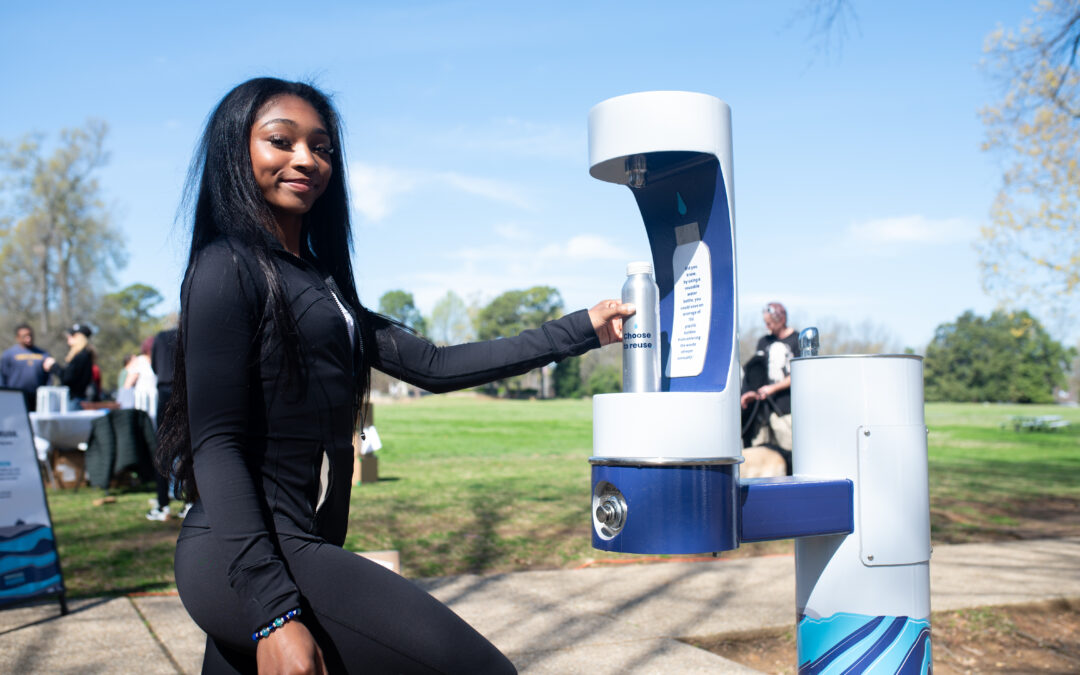As environmental concerns and the effects of pollution become increasingly evident, fostering a cultural shift from single-use, disposable products to reusable alternatives is critical. One of the most effective ways to achieve this shift is through the installation of refill stations in our schools and parks. These provide accessible, clean water and also play an important role in reducing plastic waste, promoting sustainable practices, and protecting our environment.
Single-use plastic bottles are a leading source of litter, surpassed only by cigarette butts. Moreover, less than 30% of plastic containers are recycled nationally – and most of these are actually downcycled into items of lower quality that cannot be recycled again, cutting their circularity short. This inefficiency highlights the need for a more eco-friendly solution: reusing.
By utilizing a reusable water vessel, an individual can save an average of 156 plastic bottles from entering the waste stream each year. When these are discarded and left on the ground, they can take hundreds of years to decompose, breaking down into microplastics that infiltrate our water systems and cause significant harm to ecosystems and marine life. Therefore, minimizing single-use plastic through advocating for refillable alternatives is a critical step toward environmental sustainability.
A study conducted in the UK surveyed over 64 million people and included data from 157 water dispensers and refill stations. Approximately half of the sites involved had replaced outdated drinking fountains with modern water bottle fillers, while the rest introduced them as an additional public service. The results were overwhelmingly positive – 92.3% of facilities managers reported a lowering in plastic debris on their sites, and 91.3% were pleased or very pleased with the impact of the installations. This underscores the effectiveness of refill units in reducing plastic litter.
Providing infrastructure such as water refill facilities in shared sites is a practical and effective strategy, offering suitable places for people to replenish their reusable containers and considerably decreasing the plastic that ends up in our ecosystems. Moreover, these stations ensure that all residents have access to clean, free water, lessening the need to purchase single-use plastic bottles. This convenience is particularly important in open sites where people are likely to hydrate, such as during recreational activities in parks or throughout the day for students. By integrating water refill points into these environments, we can cut down on plastic waste and promote healthier, more sustainable habits.
Closer to home, Memphis has seen similarly impressive results with the installation of water refill stations. In September 2023, Clean Memphis installed refill stations at six Compass schools in Memphis. In just one year, they have diverted over 45,000 single-use plastic bottles from landfills, illustrating the powerful impact this initiative can have. During the summer months alone, from July to August 2024, refill stations placed at local parks in Memphis have prevented over 15,000 plastic bottles from being discarded. This kind of measurable success highlights the potential for significant environmental benefits when refill stations are made widely accessible.
In Memphis, we have the added advantage of the Memphis Sands Aquifer, which provides some of the highest quality drinking water in the world. Encouraging the utilization of refill spaces not only capitalizes on this amazing natural resource but also inspires local pride and awareness of the importance of our water system.
As we continue to address ecological challenges, embracing practical, eco-friendly solutions will be crucial. The installation of refill stations in schools and parks is a powerful tool in our city’s fight against plastic pollution – by shifting from single-use plastics to reusable alternatives, we can significantly reduce the number of plastic bottles entering our landfills and waterways. These initiatives protect our ecosystems, promote public health, strengthen community ties, and support a green future. By taking these steps, we can ensure that Memphis remains a leader in environmental stewardship and a model for other communities striving for sustainability.

